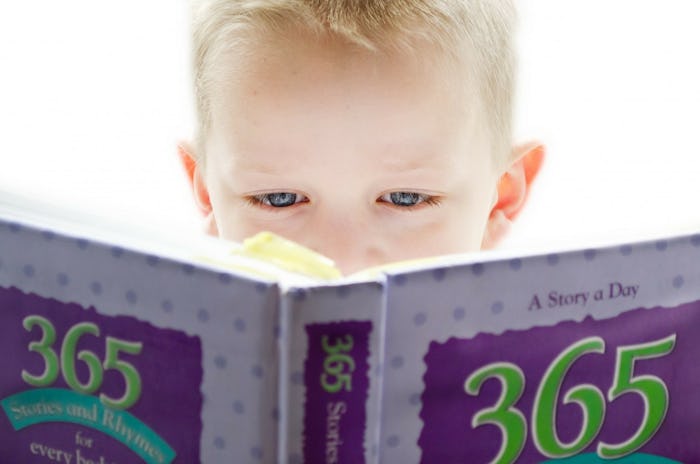It turns out that the old marketing adage "content is king" might ring true when it comes to getting kids to read — especially if the goal is to expand a child's world and vocabulary. While many studies over the years have vacillated on whether digital books are good for youngsters (or any reader, really) a recent study found that when it comes to reading comprehension, the format might not be the most important thing. A book's content matters more to kids' learning than whether it's digital or print — at least for preschoolers.
Researchers at New York University's Steinhardt School of Culture, Education, and Human Development wanted to investigate what effect storytelling's multiple mediums have on kids who are still learning to read. They presented their findings May 1 at the annual meeting of the American Educational Research Association — and they were actually a bit surprising. There has been quite a bit of research into the so-called "video deficit" in infants and toddlers: evidence that supports limiting screen time for these age groups, who seem to do much better learning from a real person. Researchers at NYU, however, wanted to know if this was true in slightly older children — particularly preschoolers.
The study, which was funded by Amazon, observed adults reading four different stories to 38 kids, ages 3 and 4 years old. Two of the tales were in a digital format, and the other two had been converted into print books that could be read by an adult to the child. All the stories came from Speakaboos, a reading app for tots that includes page-turning animation, light up words that correspond to the narration, and other interactive video and audio features. After the kids heard the stories, their level of comprehension was measured. They were asked questions about the story, its characters, and the sequence of events.
The researchers were kind of surprised to find that the format of the story wasn't what made the difference when it came to how much the kids were able to glean from the tales: rather, it was the content of the story. Whether the book was being read to them by a grown up or through the interactive app, what really made the difference in terms of how much they learned was whether the story held their interest.
Susan B. Neuman, professor of childhood and literacy education at NYU Steinhardt and coauthor of the study, said in the press release for the study:
It’s possible that when it comes to books, we have overestimated the means of delivery and have underestimated the importance of the content conveyed in the media. Although certainly not a substitute for parent-child interactive reading, digital stories from quality media sources may represent an important source of learning for young children.
For parents and teachers, the secret to getting kids excited about reading — using any medium — might be pretty simple: make sure the story isn't boring.
